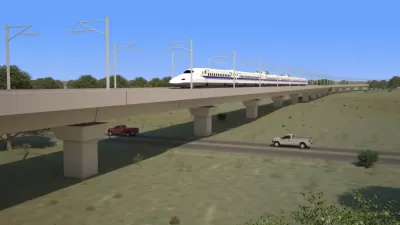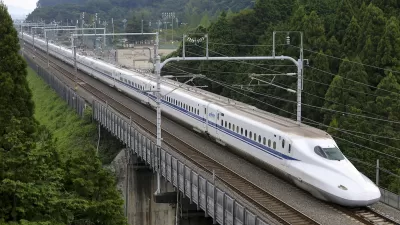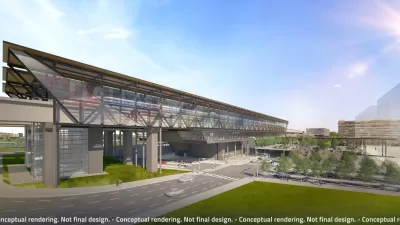A proposal for high-speed rail from Houston to Dallas is highlighting the state’s social and political divisions.

Brandon Formby reports on a proposed bullet train project that would connect Houston and Dallas. Texas Central is the private company behind the plan to build the 240-mile rail system. In addition to speeding up travel time, proponents are touting the project as a huge economic development boost for both regions.
However, opponents are concerned about the possibility of eminent domain if Texas Central starts acquiring land along the rail route. Formby says the issue is bringing to the surface a clash of ideologies in Texas state politics:
At the state Capitol, the bullet train represents the collision of two things that Republicans—who control Texas government—hold dear: private property rights and an unrestrained free market. And for two legislative sessions in a row, the free market has largely come out on top. The project has emerged relatively unscathed after bills aimed at hamstringing or killing it failed to get much traction.
Formby says this controversy is also about urban-rural tensions in the state. “The political debate is an outgrowth of a larger question confronting a state where most people now live in urban areas: How much should rural residents have to sacrifice to solve problems born in the cities they intentionally avoided or outright fled?”
The state is feeling the pressure as its transportation budget struggles to keep up with the needs of the growing populations of these metropolitan areas. While funds have largely gone into road and highway projects, the state in recent years has backed more projects by private companies, such as toll roads, and it has worked to attract the private sector.
However, Texas Central’s lead in the bullet train project has proven controversial as eminent domain looms on the horizon, says Formby:
Texas law allows railroads to use eminent domain to take land for projects. But opponents frequently argue that Texas Central doesn’t count as a railroad because it’s not currently operating any trains. Company officials counter that the $125 million they’ve already spent developing, designing, and seeking federal approval constitute operations.
Texas Central says it is conducting outreach to landowners in the proposed corridor of the rail line. “[Holly] Reed, the company executive, said they talk extensively with homeowners about how Texas Central can minimize the impacts of the project. For example, it has promised to add pass-through culverts for livestock and farm equipment in portions that will be bermed.”
Still, landowners are opposing the project and the possibility of eminent domain action. Some have refused requests to survey their properties, one landowner has sued Texas Central, and many say they have no interest in selling their land.
FULL STORY: Bullet train to the future

Alabama: Trump Terminates Settlements for Black Communities Harmed By Raw Sewage
Trump deemed the landmark civil rights agreement “illegal DEI and environmental justice policy.”

Study: Maui’s Plan to Convert Vacation Rentals to Long-Term Housing Could Cause Nearly $1 Billion Economic Loss
The plan would reduce visitor accommodation by 25% resulting in 1,900 jobs lost.

Planetizen Federal Action Tracker
A weekly monitor of how Trump’s orders and actions are impacting planners and planning in America.

Waymo Gets Permission to Map SF’s Market Street
If allowed to operate on the traffic-restricted street, Waymo’s autonomous taxis would have a leg up over ride-hailing competitors — and counter the city’s efforts to grow bike and pedestrian on the thoroughfare.

Parklet Symposium Highlights the Success of Shared Spaces
Parklets got a boost during the Covid-19 pandemic, when the concept was translated to outdoor dining programs that offered restaurants a lifeline during the shutdown.

Federal Homelessness Agency Places Entire Staff on Leave
The U.S. Interagency Council on Homelessness is the only federal agency dedicated to preventing and ending homelessness.
Urban Design for Planners 1: Software Tools
This six-course series explores essential urban design concepts using open source software and equips planners with the tools they need to participate fully in the urban design process.
Planning for Universal Design
Learn the tools for implementing Universal Design in planning regulations.
Caltrans
Smith Gee Studio
Institute for Housing and Urban Development Studies (IHS)
City of Grandview
Harvard GSD Executive Education
Toledo-Lucas County Plan Commissions
Salt Lake City
NYU Wagner Graduate School of Public Service





























